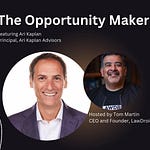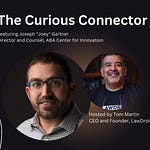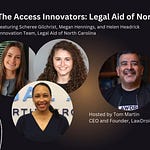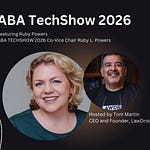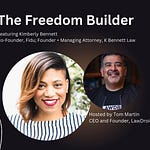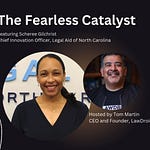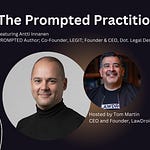Hey there Legal Rebels! 👋 I’m excited to share with you the 43rd episode of the 2025 season of the LawDroid Manifesto podcast, where I will be continuing to interview key legal innovators to learn how they do what they do. I think you’re going to enjoy this one!
If you want to understand how to navigate the intersection of commercial technology and access to justice, while creating meaningful work that outlasts any single moment, you need to listen to this episode. Ransom is at the forefront of bridging HR tech innovation with legal access initiatives and brings a unique perspective on building lasting impact in both worlds.
Making Meaningful Conections with Technology and Justice
Join me as I interview Ransom Wydner, VP of Partnerships at SixFifty.
In this episode, Ransom shares his journey from vocalist and musician to becoming a key player in the HR tech and access to justice spaces. He dives deep into how AI is transforming both the commercial world and the access to justice ecosystem, offering fascinating insights into what makes technology solutions truly valuable as AI capabilities become increasingly commoditized. Ransom demonstrates how his work at SixFifty bridges the gap between enterprise HR technology and pro bono legal tools, while maintaining a philosophy that meaningful work should create something that lasts beyond any single moment.
His stories and insights reveal a practical approach to work-life balance, the importance of disconnecting to maintain creativity, and the privilege of building something meaningful in an era where lasting impact is more achievable than ever. This episode is a must-watch for anyone curious about the intersection of commercial technology, access to justice, and creating work that matters.
The Skinny
Ransom Wydner, VP of Partnerships at SixFifty, shares his journey from small-town beginnings through music to technology leadership, now bridging the worlds of HR tech innovation and access to justice. With his affable nature and innovative spirit, Ransom discusses how AI is affecting both commercial and nonprofit legal tech spaces differently, creating both challenges and opportunities. He emphasizes the increasing importance of unique data sets and competitive advantages as AI capabilities become commoditized—what seemed revolutionary a year ago is now available to everyone for free or $20 a month. Throughout the conversation, Ransom shares his philosophy on work-life balance, the importance of truly disconnecting during time off, and what makes work meaningful: the privilege of creating something that lasts beyond your own lifetime, whether it’s a song, a tool, or an impact on someone’s life.
Key Takeaways:
AI’s democratization creates both opportunities for access to justice and challenges for commercial companies trying to maintain competitive advantages
As large language model capabilities become universally available, the value shifts to unique data sets and distinctive competitive edges
Companies that built products around basic AI features (like document chat) found their innovations commoditized within months
The rate at which AI is improving and commoditizing is unprecedented, requiring constant adaptation and strategic thinking
Work-life balance requires intentional practices: mindfulness, physical exercise, and truly disconnecting during time off
Taking real vacation time (with proper coverage, not just piling up work) is essential for sustained performance and creativity
The most meaningful work comes from creating something that lasts beyond your own lifetime—easier to achieve now than ever in human history
True satisfaction comes from completing difficult tasks well, whether that’s a musical performance, a product launch, or a partnership agreement
The intersection of commercial HR tech and access to justice work reveals important lessons about what makes technology solutions sustainable
Ransom co-chaired the Emerging Leaders Council at LSC (Legal Services Corporation) and managed SixFifty’s pro bono and access to justice tools
Notable Quotes:
“I think what’s been really interesting for me lately has been comparing and contrasting the commercial world. So SixFifty, we work in the HR tech industry, you know, kind of world where AI is huge. And then also the access to justice world.” - Ransom Wydner (03:10-03:23)
“The hard part of AI in the commercial world is AI, just the stuff that anybody can get, you know, for free or maybe $20 a month, gets better and better and better, faster and faster and faster, which is amazing if you work in access to justice and you’re trying to find ways to make something affordable to people who do not have the funds to pay for legal help.” - Ransom Wydner (03:49-04:09)
“By the time they go to market, the thing that made it unique is now just a thing that anybody can do. So it’s been really interesting to watch how important and how valuable having a unique data set...some kind of a competitive edge. That’s always been the case, but it seems like it’s more true now than it was a year ago.” - Ransom Wydner (04:30-04:56)
“As these tools get better and better, it’s gonna be more and more important to have a thing that you do uniquely, you know, that you can protect that can’t just be duplicated by somebody else.” - Ransom Wydner (48:12-48:22)
“I’m one of those people who needs...whose work benefits also from unplugging and, you know, as much as possible. So I try to practice mindfulness just a little two minutes a day of trying not to think of anything, which is really hard when your mind’s going a billion miles an hour.” - Ransom Wydner (49:07-49:23)
“When you take time off, take it off. And it’s so important...find somebody who will actually cover for you as much as possible so that you’re not just coming back to a giant pile of work.” - Ransom Wydner (50:21-50:37)
“Nobody’s impressed that you haven’t taken a day off in a year.” - Ransom Wydner (51:10)
“Thousands of years ago, a pharaoh would have to spend generations building a pyramid that would last beyond their lifetime...And now it’s so easy to build something, whether it’s a piece of art or a piece of work or whatever it may be that speaks to you.” - Ransom Wydner (52:13-52:38)
“The ability to...Maybe it’s a song I wrote, or maybe it’s a tool that I built, or maybe it’s an impression I made on somebody...the idea that I can do something that may outlive me and I don’t have to be a pharaoh and build a pyramid to do it, that is a huge thing about what motivates me and makes it worth it.” - Ransom Wydner (52:40-52:58)
Clips
Stop Treating Passion As Proof
When AI Helps (Or Hurts) Justice
AI Is Coming for High-Paying Jobs
Why AI Startups Lose Their Edge
Ransom’s journey reflects a unique blend of artistic sensibility and technological innovation. His background as a vocalist and musician informs his approach to building partnerships and creating meaningful work; there’s an understanding that the best work comes from completing difficult things well and then moving on to the next challenge. His perspective on work-life balance is refreshingly practical: it’s not about achieving perfect equilibrium, but about knowing when to disconnect, taking real time off with proper coverage, and engaging in activities that create problems bigger than your work problems (like sweating through a midday run).
What stands out most is Ransom’s philosophical approach to meaningful work. In an era where creating something lasting no longer requires pharaoh-level resources, we all have the privilege and opportunity to build things that outlive us—whether through technology tools, songs, or the impressions we make on others. This perspective shapes how he approaches both his commercial work at SixFifty and his access to justice initiatives.
Closing Thoughts
As a legal tech entrepreneur who’s been in this space for years, I find Ransom’s perspective particularly valuable. He’s navigating two parallel universes, commercial HR tech where AI is simultaneously revolutionary and rapidly commoditizing, and access to justice work where that same commoditization creates unprecedented opportunities for affordable legal help. This dual perspective gives him unique insights into what makes technology solutions truly valuable when everyone has access to the same foundational AI capabilities.
What resonates most with me is Ransom’s emphasis on creating meaningful work that lasts. In the legal tech space, it’s easy to get caught up in the latest features or capabilities, but Ransom reminds us that what matters is building something that continues to have impact long after we’ve moved on. Whether that’s a partnership that helps people access justice, a tool that solves real problems, or even just a conversation that changes someone’s perspective; that’s the work worth doing.
For our Legal Rebels community, Ransom’s story serves as both inspiration and practical guidance. His approach to work-life balance is refreshingly honest: take real time off, find ways to truly disconnect, and remember that nobody’s impressed by burnout. His philosophy on meaningful work challenges us to think beyond the immediate task and consider what we’re building that will last.
As AI continues to democratize access to powerful capabilities, those who can identify unique value propositions and create lasting impact—while maintaining their own wellbeing—will be the ones who thrive. The future belongs to bridge builders like Ransom who can navigate between commercial innovation and social impact, creating work that matters in both worlds.





